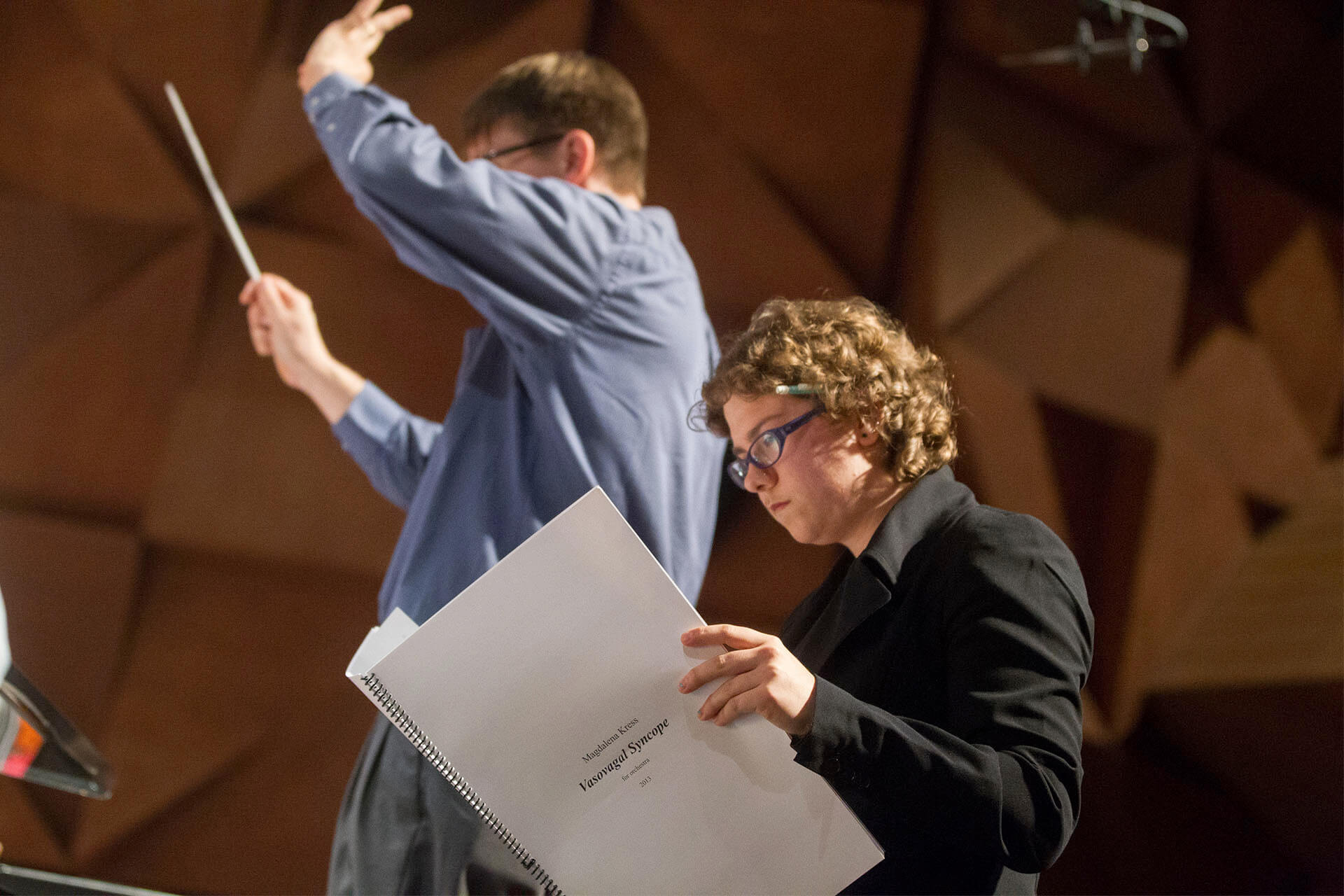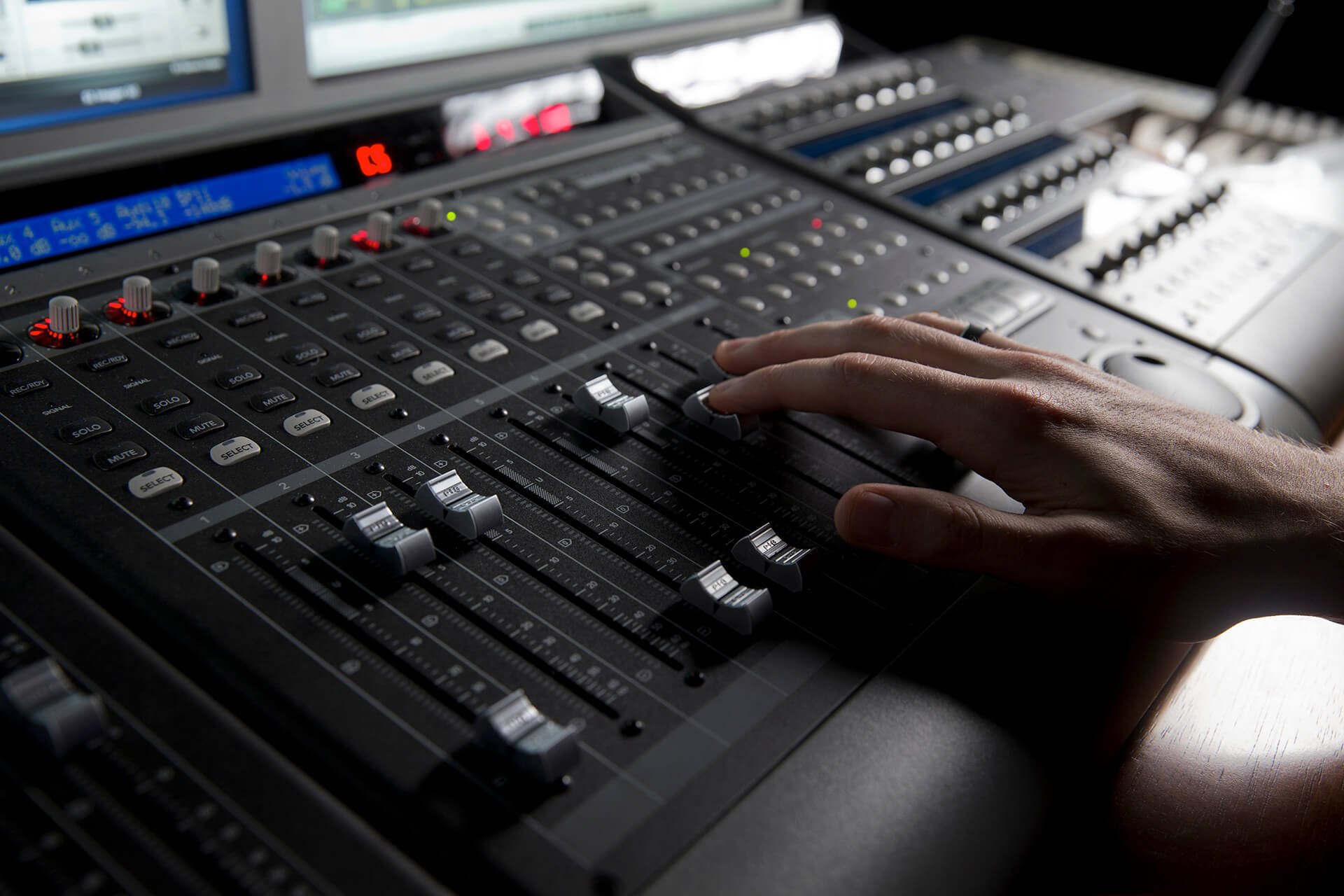Nationally recognized for student experience
The Wall Street Journal

Bachelor of Music (B.M.)
Music Composition
Bowling Green State University is recognized as one of the best music composition schools for its esteemed faculty, outstanding alumni achievements and strong reputation for musical excellence.
A bachelor’s degree in music composition from BGSU empowers you to transform your creative ideas into powerful, original works that resonate with wide audiences and leave a lasting impact.
Master both the science and art of music-making with courses that instill in-depth understanding and experience in composition, theory and technology. Join a dynamic, growing music community that offers invaluable experiences and professional connections.
The world is fast-changing, but skilled composers continue to be in high demand. With a bachelor’s degree in music composition, our graduates go on to thriving careers as composers, directors, sound designers, educators, producers and more.
Why study music composition at BGSU in Ohio?
- Learn from the very best. BGSU is proud to offer students music composition instruction from incredibly talented, award-winning professors. Ranges of expertise are broad, but all share zeal for elevating new musicians embarking on their own exciting music careers.
- Make the most of facilities. BGSU has more than 70 practice rooms, an 822-seat concert hall and a 231-seat recital hall. Get hands-on experience in state-of-the-art computer labs and the Electroacoustic Studio.
- So many moments to shine. Students earning a music composition degree have many chances to showcase their talent, with ongoing special events, residencies and reading sessions.
- Set the stage for real-world success. Engage and collaborate with esteemed guest composers and performers, including preeminent ensembles at high-profile events.
- Small class sizes. The College of Musical Arts has a 9:1 student-faculty ratio. Learning opportunities involve small group instruction and 1:1 lessons.
- Elevate your potential. Alumni from a BGSU music composition degree go on to make a name for themselves in the music profession. Graduates are frequently accepted into prestigious master’s and doctoral programs, including the Eastman School of Music, Cleveland Institute of Music, Manhattan School of Music and the University of Michigan.
The BGSU College of Musical Arts presents 350+ public events annually and is a major cultural resource for the campus, northwest Ohio and beyond.
“Believe it or not, a little town in northwest Ohio is one of the liveliest spots for new music in the whole United States.”
- Steven Stucky
Pulitzer Prize-winning American composer
Music composition admissions
You must audition to major in music composition. The audition may be held at the time of the initial College of Musical Arts instrumental/vocal audition or during the course of degree study. All students enter as pre-composition majors.
Pre-composition degree applicants must:
- Submit original scores, with recordings if available
- Pass their main performance medium test
- Score high on the music theory placement exam
Upon acceptance, pre-composition majors consult with an advisor to craft a course of study that aligns with degree requirements and their particular career goals. At the end of sophomore year, pre-composition majors submit a portfolio of original compositions for assessment, which they must pass to be declared a composition major.
#1 public university in Ohio for career prep
The Wall Street Journal
Career – what can you do with a music composition degree?
Future musicians looking for the best colleges for music composition choose BGSU because it opens the door wide to so many career connections and possibilities. With a music composition degree from BGSU, graduates get to make their own way forward based on their unique strengths and preferred genres, industries and roles.
Career opportunities for U.S. music directors and composers are expected to remain steady over the next decade, according to the U.S. Bureau of Labor Statistics. Many music composers and directors land lucrative roles within:
- Performing arts companies
- Colleges, universities and professional schools
- Motion picture, video and gaming industries
- Sound recording industries
- Elementary and secondary schools
- Religious organizations
- Agents and managers for artists, athletes, entertainers and other public figures
- Promoters of performing arts, sports and similar events
- Media streaming distribution services, social networks and other media networks and content providers
Those in music director roles usually lead musical groups or individual artists in performances or recording sessions. Composers write and arrange original music in a variety of musical styles.
Career paths
- Musical director
- Music composer
- Music professor/music teacher
- Music arranger/music editor
- Music software consultant
- Music journalist or radio DJ
- Sound designer/sound engineer
- Music producer
Quick Facts from the Bureau of Labor Statistics
Mean annual wages near $88,000 for music directors and composers
(Source: U.S. Bureau of Labor Statistics)
Curriculum
The undergraduate music composition curriculum is crafted with care to allow for customization, depending on your primary area of focus and projected career path.
- Receive private lessons on your main instrument and in composition
- Participate in small and large ensembles
- Take supporting courses in music technology, orchestration and arranging, counterpoint, keyword harmony and conducting – all in addition to completing core music classes, such as music theory, aural skills and music history.
Music composition majors are strongly urged to participate in small ensembles for performance practice and music showcases in numerous genres.
Each semester, composition majors submit core coursework for jury examination. Faculty review determines final grades. Students must maintain a 3.0 GPA.
The capstone experience for music composition majors is a senior recital.

Sample courses
- Orchestration
- Music Technology
- Conducting
- Area of Studies in World Music
- History and Literature of Jazz
#1 university in Ohio – big or small, public or private – students would choose again
The Wall Street Journal
MidAmerican Center for Contemporary Music
The MidAmerican Center for Contemporary Music serves as the hub for BGSU’s distinctive specialty in contemporary music. It regularly showcases outstanding student works and performances. The music world looks forward each year to the Bowling Green New Music Festival (since 1980) and the Music at the Forefront Concert series.
- Administers generous grants supporting new contemporary student music projects and research
- Ongoing organization of the New Music From Bowling Green concert series, featuring both faculty and student performances at prestigious venues across the country
- Produces a radio broadcast with WGTE-FM in Toledo
- Keeps an archive of 10k+ scores – invaluable musical scholarship resources in contemporary music
The bachelor’s program in music composition is part of the BGSU College of Musical Arts.
Accreditation
The Bowling Green College of Musical Arts is accredited by the National Association of Schools of Music (NASM) and is in good standing.
Bowling Green State University [BGSU] is accredited by the Higher Learning Commission. BGSU has been accredited by the Higher Learning Commission since 01/01/1916. The most recent reaffirmation of accreditation was received in 2022-2023, with our next reaffirmation of accreditation scheduled for 2032-2033. Questions should be directed to the Office of Institutional Effectiveness.
Request Information
Updated: 05/15/2025 11:24AM

